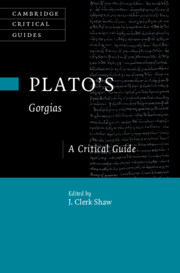Book contents
- Plato’s Gorgias
- Cambridge Critical Guides
- Plato’s Gorgias
- Copyright page
- Contents
- Contributors
- Abbreviations
- Introduction
- Chapter 1 Gorgias of Leontini and Plato’s Gorgias
- Chapter 2 Ancient Readers of the Gorgias
- Chapter 3 Philosophy and the Just Life in the Gorgias
- Chapter 4 Socrates and Coherent Desire (Gorgias 466a–468e)
- Chapter 5 The Ethical Function of the Gorgias’ Concluding Myth
- Chapter 6 Shame in the Gorgias
- Chapter 7 Desire and Argument in Plato’s Gorgias
- Chapter 8 Cooperation and the Search for Truth
- Chapter 9 Freedom, Pleonexia, and Persuasion in Plato’s Gorgias
- Chapter 10 Revealing Commitments
- Bibliography
- Index
- Cambridge Critical Guides
Chapter 5 - The Ethical Function of the Gorgias’ Concluding Myth
Published online by Cambridge University Press: 25 May 2024
- Plato’s Gorgias
- Cambridge Critical Guides
- Plato’s Gorgias
- Copyright page
- Contents
- Contributors
- Abbreviations
- Introduction
- Chapter 1 Gorgias of Leontini and Plato’s Gorgias
- Chapter 2 Ancient Readers of the Gorgias
- Chapter 3 Philosophy and the Just Life in the Gorgias
- Chapter 4 Socrates and Coherent Desire (Gorgias 466a–468e)
- Chapter 5 The Ethical Function of the Gorgias’ Concluding Myth
- Chapter 6 Shame in the Gorgias
- Chapter 7 Desire and Argument in Plato’s Gorgias
- Chapter 8 Cooperation and the Search for Truth
- Chapter 9 Freedom, Pleonexia, and Persuasion in Plato’s Gorgias
- Chapter 10 Revealing Commitments
- Bibliography
- Index
- Cambridge Critical Guides
Summary
The Gorgias ends with Socrates telling an eschatological myth that he insists is a rational account and no mere tale. Using this story, Socrates reasserts the central lessons of the previous discussion. However, it isn’t clear how this story can persuade any of the characters in the dialogue. Those (such as Socrates) who already believe the underlying philosophical lessons don’t appear to require the myth, and those (such as Callicles) who reject these teachings are unlikely to be moved by this far-fetched tale. This raises the question of who the myth is told for and what function it is meant to serve. This chapter argues that the myth is aimed not at Callicles, but at Socrates and those who aspire to follow him. There are uncertainties about the philosophical life deriving from the nature of embodiment, as well as reasons to doubt the connection between happiness and virtue. The myth assists with the former by presenting an image that draws a philosopher away from the goods of the body toward the goods of the soul. It assists with the latter by presenting an image of cosmic justice, thereby securing happiness in proportion to virtue.
- Type
- Chapter
- Information
- Plato's GorgiasA Critical Guide, pp. 87 - 104Publisher: Cambridge University PressPrint publication year: 2024

